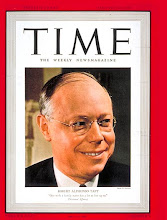The sixth of ten children, William F. Buckley, Jr. forged a movement that for decades was linked to his name.
The founder of "National Review" was a renowned controversialist and conversationalist. He hosted "Firing Line" for 33 years, the record for the longest-running show with the same host.
Buckley stormed onto the scene in 1951 with his "God and Man at Yale." He deplored how his university had recanted its religious and economic traditions for left-wing collectivism and Keynsianism. He was considered too brash and arrogant, but he also put himself on the map and gave modern American conservatism its start. Ultimately, he gave it respectability.
His wit was razor sharp and is quoted as saying, "Liberals are those who say they want to hear other viewpoints but are shocked and offended to discover that there are other viewpoints," and "The purpose of an open mind is to close it – on certain subjects, otherwise it is the abdication of the responsibility to think." In 1965 he ran for mayor of New York City as a member of the Conservative Party of New York when he was unsatisfied with the liberal Republican on the ticket. When asked what he would do if he won, Buckley quipped, "I’d demand a recount."
Conservatism in America, prior to "National Review"’s inception in 1955, was considered too scattered and varying to be of any use or any threat to the governing establishment. But he consolidated support from libertarians and conservatives in this country and forged a new coalition which, from the looks of things, he barely outlived.
A defender of Senator Joseph McCarthy and the crusade against Communism, Buckley wrote the John Birch Society out of the conservative movement when the group tried to label President Eisenhower as a Communist. He did not write, but published a scathing review of Ayn Rand’s "Atlas Shrugged" and essentially wrote the Randians out of the movement for their rejection of a fundamental belief in God and the importance of tradition. It was a sleight that the Randians, especially Rand herself never forgave.
The "supply-side whoopee," as he was once called, Buckley helped lead the Republican Party to nominate Barry Goldwater in 1964, who despite such a poor showing, led to the nomination and victory of Ronald Reagan and the conservatives in 1980. Another 16 years of organization and transmission of thoughts made conservatism mainstream.
Buckley retired as editor of "National Review" in 1990 and sold his final stock in the magazine in 2004 and spent his retirement (or rather, semi-retirement) years somewhat secluded from public life, still occasionally speaking on the radio or on Charlie Rose’s PBS program.
He reluctantly supported the invasion of Iraq in 2003 but by 2004 came to oppose it, like many conservatives of an older generation. He said that if he had known in 2003 what he knew by 2004, he would never have supported the operation. If only more people possessed his humility and a modicum of his intellect we might all have been better.
He was found dead in his study, which is only fitting. He was an erudite scholar whose vocabulary was maybe only outdone by the exhaustive Oxford Dictionary of the English Language. Maybe.
Russell Kirk left us in 1994. Barry Goldwater in 1998. Reagan died in 2004. Now we have also lost Bill Buckley. May we all be so lucky to read his words for we shall never see the likes of him again.
William F. Buckley, Jr. Dead at 82. Thank you, Bill. We shall never forget you.
Wednesday, February 27, 2008
Subscribe to:
Post Comments (Atom)















1 comment:
A very good tribute; highlighting his most significant actions in his own time & the acts that should teach us the most today. I believe the movement Buckley organized will continue because it was based on principles, not personalities.
Post a Comment